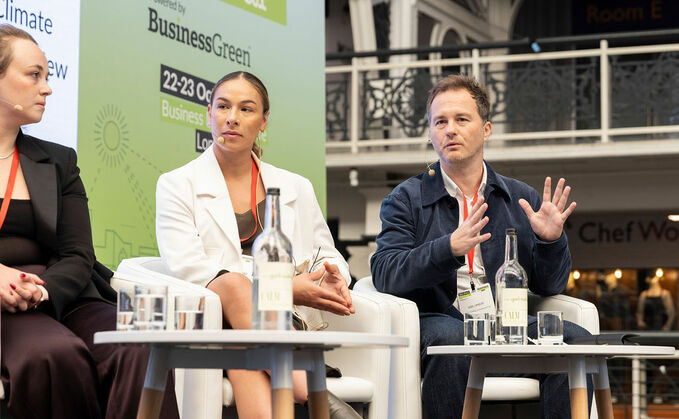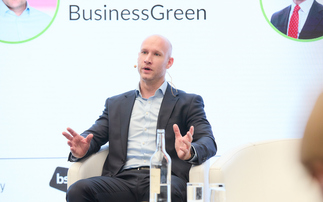
Karl Limbert, director of strategy and external relations at Equans (R) - Credit: Naomi Gabrielle Photography
Firms neglecting adaptation when working to mitigate climate impacts are in danger of locking-in long-term vulnerability, experts tell Net Zero Festival 2024
Businesses risk "locking in" long-term vulnerability to climate threats across their operations and supply chains unless they develop corporate strategies that ensure mitigation and adaptation measures work "holistically" together, several experts told BusinessGreen's Net Zero Festival last week.
Discussing what practical steps companies can take towards climate resilience for people, operations, and buildings on the opening day of of the UK's leading green business event last week, Karl Limbert, director of strategy and external relations at Equans, warned there can no longer be a "disconnect" between climate adaptation and emissions-reduction strategies.
"Unless you're building in the adaptation lens alongside the mitigation lens you probably are going to stumble into lock-in risks," he said. "But it is absolutely addressable."
As an example, he highlighted the importance of taking a holistic view when developing plans to improve the energy efficiency of a building or commercial facility.
"If you're only looking at the world through the lens of energy efficiency, then the temptation is to go to building fabric and make it as airtight as possible - because that means that heat doesn't leak in the winter," he explained. "The problem with that is that is that if you're not paying attention to the fact that climate is also warming at the same time, you're going to lock in heat during the summer. But it's absolutely possible to design or retrofit a building that's fit for both purposes."
Limbert also stressed that such climate threats were already here today, and worsening, with far-reaching impacts on society - but these threats could be curtailed with well-designed mitigation and adaptation efforts. As an example, he highlighted Equans' work with the Ministry of Justice on improving the climate resilience of court rooms and cells in order to reduce potential disruption to public services.
"On the one hand, there are climate risks that impact courts and things like holding cells," he said. "Risks like extreme heat and thermal comfort intersect with those types of spaces in really problematic ways. There's the work that we can do to mitigate that."
Such threats can also impede people from getting to the court in the first place, which can result in costly delays and postponements to hearings, he added. "What if a road is flooded on the day that there's a big court case? What can we do to design service provision around some of that risk and use that to enhance service provision?" he asked. "It's not just about avoiding loss and damage, it's also about enhancing your ability to keep delivering services, regardless of the fact that the climate has changed."
Regardless of the pace of global decarbonisation efforts, every scenario points to a world where climate impacts and risks escalate in the future, Limbert cautioned. "That core insight really needs to be built into everyone's sustainability story going forward," he stressed.
Within the UK, he described the health threat posed to vulnerable citizens from heat waves and overheating in buildings, as well as those from heavy rainfall and associated risks around flooding, as the biggest "very proximate" risks that are already hitting society harder and harder due to climate change.
"There isn't a scenario where a building or piece of infrastructure won't face in some cases quite serious physical climate risks going forwards," he explained. "For us it's less about new builds, the really big picture is existing buildings - which, of course, is most of the stock in the country."
However, new infrastructure is also being developed without enough consideration of the worsening climate threats it is set to face both now and into the future, warned Emma Howard Boyd, chair of the London Climate Resilience Review and former chair of the Environment Agency.
Also speaking at the event last Tuesday, she said it was critical for the government to ensure its economic growth and 2030 clean power ambitions help improve long-term resilience to climate change rather than "lock in vulnerability". To do that, governance decision-making structures need to be reviewed to ensure that every decision takes climate risk into account, she added.
Howard Boyd stressed there was also a need to stop looking at climate resilience as a means of simply reducing climate threats, and to instead view such efforts as a major economic opportunity for businesses and the government alike. As an example, Howard Boyd cited new housing development in East London over recent decades which she argued had been unlocked by the protection offered by the Thames Barrier flood defence system, all of which had been the result of long-term decision making that took proper account of flood risks.
"We are fortunate enough in this country to still have time to work this agenda through the opportunity lens," she added. "Some of the data and alerts that we are now seeing, if taken seriously by businesses or the insurance industry, mean that we are ready to respond at speed and help our businesses – but also help the poorer and more vulnerable."
Discussing the immediacy of the challenge, Stephanie Handjiiska - account director at physical climate risk company Climate X - said that the firm was already seeing business leaders allocating increased bandwidth and budgeting to resilience in planning processes.
"We're definitely already in the story where some buildings are just uninsurable and that's a really big problem," she said during the event. "It's not just a box ticking exercise any more in terms of ‘we do need some kind of sustainability reporting'. It's getting more and more actionable."
Equans is a partner of the Net Zero Festival 2024.
Keep up to date with all the latest green business news by signing up to the free Daily and Weekly BusinessGreen Newsletters.









